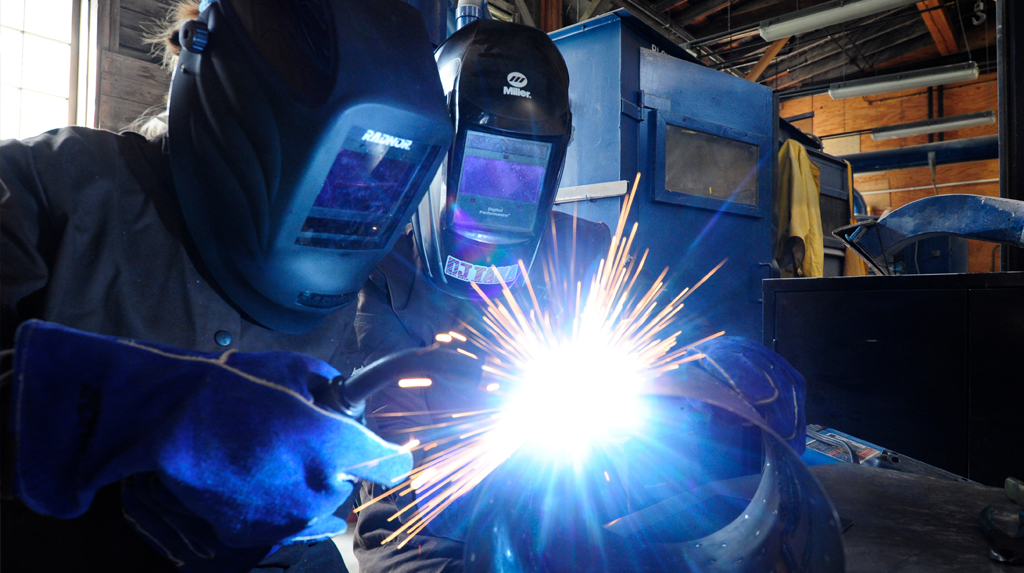Brief
Rosie's Girls STEAM Camps
Building Grit With Power Tools and Power Skills
Connected Science Learning January-March 2019 (Volume 1, Issue 9)
By Alison Lamagna

Where can a middle school girl wield a chop saw or welder in one moment, and build her interpersonal and self-advocacy skills in the next? For 20 years, Rosie’s Girls, a program of Vermont Works for Women, has helped girls and gender-nonconforming youth in grades 6–8 develop grit, create connections, and expand their sense of possibilities through hands-on exploration of the building and welding trades. The program uses multiple STEAM (science, technology, engineering, art, and math) concepts in a safe, welcoming space where campers can break down barriers, take positive risks, and try new things.
At camp, participants practice core STEAM skills, including learning to read and use project plans, translating a 2-D drawing into a 3-D project, converting measurements between decimals and fractions, using a measuring tape, and problem-solving when pieces don’t fit together as anticipated. They start by following a set of plans for a predetermined project, and later engineer and design their own individualized projects. Along the way, they are part of a cohesive team and participate in “power skills” lessons—addressing areas such as healthy relationships, self-compassion, making mistakes, and body image—to discover more about themselves and navigate social structures that are often stacked against girls, women, and gender-nonconforming individuals.
 Our focus on STEAM and nontraditional career exploration is driven by our mission to “help women and girls recognize their potential and explore, pursue, and excel in work that leads to economic independence.” On average, careers that are nontraditional for females offer salaries that are significantly higher than female-dominated careers, which contributes to the fact that the poverty rate in the United States is higher among women than men in 47 states. According to the U.S. Bureau of Labor Statistics, only 2–4% of welders in the nation are women. Among the barriers for women to enter these fields are lack of exposure and lack of role models. Giving girls and gender nonconforming youth the chance to explore STEAM and nontraditional career–related activities in a safe, positive, and supportive environment helps break down those barriers and reshape what they think they are personally capable of, thereby expanding their notion of future options.
Our focus on STEAM and nontraditional career exploration is driven by our mission to “help women and girls recognize their potential and explore, pursue, and excel in work that leads to economic independence.” On average, careers that are nontraditional for females offer salaries that are significantly higher than female-dominated careers, which contributes to the fact that the poverty rate in the United States is higher among women than men in 47 states. According to the U.S. Bureau of Labor Statistics, only 2–4% of welders in the nation are women. Among the barriers for women to enter these fields are lack of exposure and lack of role models. Giving girls and gender nonconforming youth the chance to explore STEAM and nontraditional career–related activities in a safe, positive, and supportive environment helps break down those barriers and reshape what they think they are personally capable of, thereby expanding their notion of future options.
A study by the Franklin Institute found that informal STEM programs for girls “influence women’s attitudes toward and understanding of STEM, shaping future education, careers, leisure pursuits, and ways of thinking about what science is and who does it.” In addition, the researchers found that such programs positively influence girls’/women’s personal identity and skills. In analyses of pre- and postsurveys, Rosie’s Girls has demonstrated a positive impact on participants in our three outcome areas: In 2018, 73% of campers increased grit, 50% increased feelings of connection, and 71% reported having expanded ideas of what is possible.
When asked what they learned at Rosie’s Girls, camper responses ranged from “how to use power tools to build things” and “how to weld,” to “I learned that women can do anything” and “focus on people’s inner qualities instead of outer qualities.” For one week, they are immersed in a world free from gender bias, where they are valued for who they are and are allowed the chance to explore something new and exciting.
Alison Lamagna (alamagna@vtworksforwomen.org) is education program manager at Vermont Works for Women in Winooski, Vermont.
Careers STEM Informal Education


